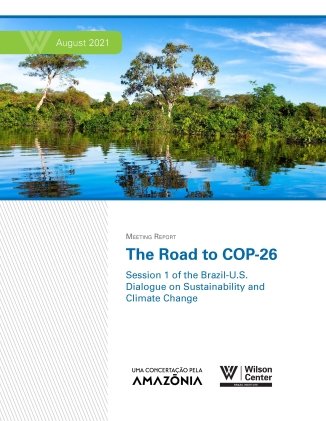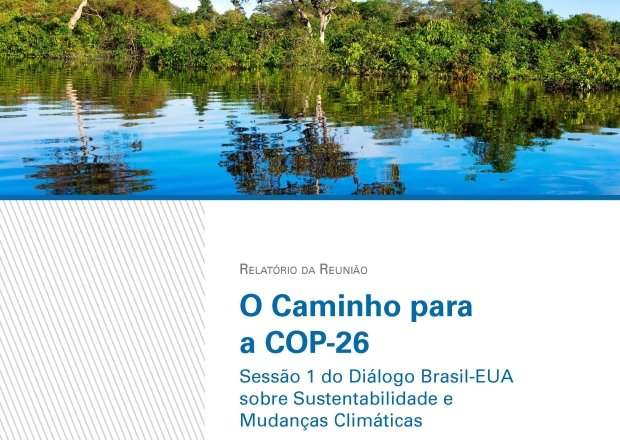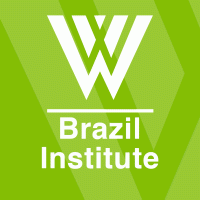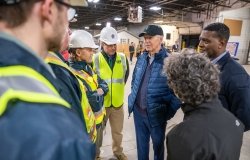Meeting Report | The Road to COP-26: Session 1 of the Brazil-US Dialogue on Sustainability and Climate Change


In late July 2021, the Wilson Center, in partnership with Uma Concertação Pela Amazônia hosted a discussion with Brazilian and US nongovernmental stakeholders on the potential for Brazil-US cooperation in the lead up to the 26th UN Climate Change Conference of the Parties (COP26) in Glasgow, with a focus on principles of cooperation and carbon markets.
Over the course of the session, four major policy recommendations emerged as critical to bolstering bilateral Brazil-US cooperation on climate change and supporting Brazilian efforts to reduce carbon emissions, especially those driven by land use.
Report Recommendations
1. The Amazon will play a long-term constructive role in the climate agenda only through its own sustainable development, which requires partnership and significant investments—not just philanthropy.
Forest conservation must go hand-in-hand with opportunities for ethical, sustainable livelihoods in order to address many of the root causes of Amazon deforestation. This transition towards self-sustaining and profitable nature-based solutions in Brazil will require significant investment. In the short term, relatively small amounts of seed funding, if available quickly, can create a foundation for collaboration and action, building a pathway (and confidence) for much larger future financial flows. The US government can play a substantial role in helping to guide and direct private sector capital in this effort, as well as partnering with Brazil on technical and scientific capacity-building to support the rapid adoption of emissions reduction initiatives.
2. There needs to be stronger collaboration with civil society, private sector and subnational actors, especially the Amazon states, on emissions reduction projects and financing.
The emissions reduction potential from subnational governments is significant, and they can also be important partners in strengthening transparency, monitoring, data reporting, and coordination with local stakeholders. In particular, collaboration with the Interstate Consortium of the Legal Amazon, which represents nine states and 59 percent of Brazil’s territory, through LEAF and other mechanisms, is an opportunity to support regional efforts to combat deforestation and promote a green recovery in the Amazon.
3. There needs to be a pipeline for verifiable, investable projects and solutions at scale.
There is significant demand among US and other foreign investors for a verified pipeline of large-scale emissions reductions projects in Brazil, similar to what investors already find in the logistics and energy sectors, for example. The challenge is not merely one of identifying projects that could be scaled for greater impact, but also developing governance and accountability frameworks for market-based emissions reduction mechanisms. Technical cooperation and capacity-building assistance from US stakeholders and others can help bridge this credibility gap. In the long run, private sector investment could reinforce the need for scientifically-based verification and transparency standards for carbon credits. The key is leveraging technical expertise and funding together for greater impact.
4. Integrating a project-based approach with jurisdictional approach for emissions reduction is critical to climate ambition.
There is growing consensus that interventions at all scales should be integrated, to maximize the engagement of a diverse range of funders while addressing methodological challenges. More agile and immediate investments in individual projects can help drive on-the-ground capacity and financing to support larger, jurisdictional programs. Similarly, technical support and funding at the jurisdictional level—such as through LEAF—can incentivize the development of projects that use more robust MRV systems and contribute to national emissions accounting.

Relatório da Reunião (Português)
Relatório da Reunião | O Caminho para a COP-26 | Ao longo do primeiro encontro do Diálogo Brasil-EUA sobre Sustentabilidade e Mudanças Climáticas, com foco nos princípios de cooperação e mercados de carbono, foram pontuadas quatro recomendações de políticas fundamentais para fomentar a cooperação bilateral em mudanças climáticas e para apoiar os esforços brasileiros na redução de emissões de carbono, especialmente aquelas impulsionadas pelo uso da terra.
Leia o RelatórioAbout the Author

Brazil Institute
Read More
Brazil Institute
The Brazil Institute—the only country-specific policy institution focused on Brazil in Washington—works to foster understanding of Brazil’s complex reality and to support more consequential relations between Brazilian and US institutions in all sectors. The Brazil Institute plays this role by producing independent research and programs that bridge the gap between scholarship and policy, and by serving as a crossroads for leading policymakers, scholars and private sector representatives who are committed to addressing Brazil’s challenges and opportunities. Read more










